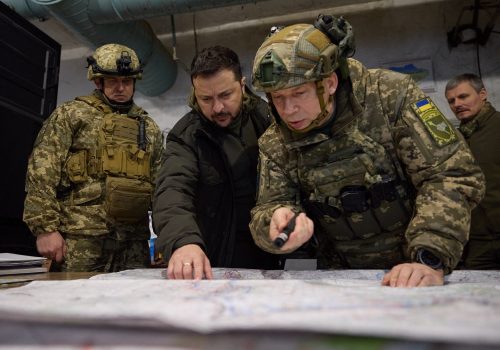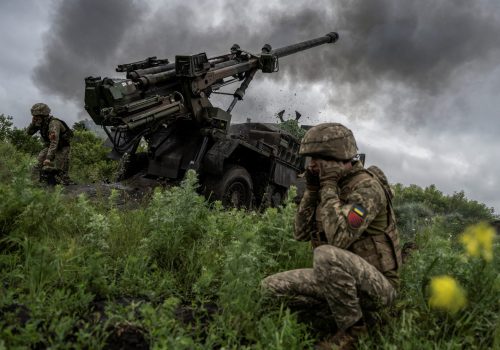As the world grapples with the implications of rapidly evolving Artificial Intelligence (AI) technologies, Ukraine has recently presented a national road map for AI regulation that seeks to balance the core values of innovation and security.
Businesses all over the world are currently racing to integrate AI into their products and services. This process will help define the future of the tech sector and will shape economic development across borders.
It is already clear that AI will allow us all to harness incredible technological advances for the benefit of humanity as a whole. But if left unregulated and uncontrolled, AI poses a range of serious risks in areas including identity theft and the dissemination of fake information on an unprecedented scale.
One of the key objectives facing all governments today is to maximize the positive impact of AI while minimizing any unethical use by both developers and users, amid mounting concerns over cyber security and other potential abuses. Clearly, this exciting new technological frontier must be regulated that ensure the safety of individuals, businesses, and states.
Some governments are looking to adopt AI policies that minimize any potential intervention while supporting business; others are attempting to prioritize the protection of human rights. Ukraine is working to strike a balance between these strategic priorities.
Stay updated
As the world watches the Russian invasion of Ukraine unfold, UkraineAlert delivers the best Atlantic Council expert insight and analysis on Ukraine twice a week directly to your inbox.
Today, Ukraine is among the world’s leading AI innovators. There are more than 60 Ukrainian tech companies registered as active in the field of artificial intelligence, but this is by no means an exhaustive list. Throughout Ukraine’s vibrant tech sector, a large and growing number of companies are developing products and applications involving AI.
The present objective of the Ukrainian authorities is to support this growth and avoid over-regulation of AI. We recognize that the rapid adoption of regulations is always risky when applied to fast-moving innovative fields, and prefer instead to adopt a soft approach that takes the interests of businesses into account. Our strategy is to implement regulation through a bottom-up approach that will begin by preparing businesses for future regulation, before then moving to the implementation stage.
During the first phase, which is set to last two to three years, the Ukrainian authorities will assist companies in developing a culture of self-regulation that will enable them to control the ethics of their AI systems independently. Practical tools will be provided to help businesses adapt their AI-based products in line with future Ukrainian and European legislative requirements. These tools will make it possible to carry out voluntary risk assessment of AI products, which will help businesses identify any areas that need improvement or review.
Ukraine also plans to create a product development environment overseen by the government and involving expert assistance. The aim is to allow companies to develop and test AI products for compliance with future legislation. Additionally, a range of recommendations will be created to provide stakeholders with practical guidelines for how to design, develop, and use AI ethically and responsibly before any legally binding regulations come into force.
For those businesses willing to do more during the initial self-regulation phase, the Ukrainian authorities will prepare voluntary codes of conduct. Stakeholders will also be issued a policy overview providing them with a clear understanding of the government’s approach to AI regulation and clarifying what they can expect in the future.
Eurasia Center events

During the initial phase, the Ukrainian government’s role is not to regulate AI usage, but to help Ukrainian businesses prepare for inevitable future AI regulation. At present, fostering a sense of business responsibility is the priority, with no mandatory requirements or penalties. Instead, the focus is on voluntary commitments, practical tools, and an open dialogue between government and businesses.
The next step will be the formation of national AI legislation in line with the European Union’s AI Act. The bottom-up process chosen by Ukraine is designed to create a smooth transition period and guarantee effective integration.
The resulting Ukrainian AI regulations should ensure the highest levels of human rights protection. While the development of new technologies is by nature an extremely unpredictable process for both businesses and governments, personal safety and security remain the top priority.
At the same time, the Ukrainian approach to AI regulation is also designed to be business-friendly and should help fuel further innovation in Ukraine. By aligning the Ukrainian regulatory framework with EU legislation, Ukrainian tech companies will be able to enter European markets with ease.
AI regulation is a global issue that impacts every country. It is not merely a matter of protections or restrictions, but of creating the right environment for safe innovation. Ukraine’s AI regulation strategy aims to minimize the risk of abuses while making sure the country’s tech sector can make the most of this game-changing technology.
Mykhailo Fedorov is Ukraine’s Vice Prime Minister for Innovations and Development of Education, Science, and Technologies, and Minister of Digital Transformation.
Further reading
The views expressed in UkraineAlert are solely those of the authors and do not necessarily reflect the views of the Atlantic Council, its staff, or its supporters.

The Eurasia Center’s mission is to enhance transatlantic cooperation in promoting stability, democratic values and prosperity in Eurasia, from Eastern Europe and Turkey in the West to the Caucasus, Russia and Central Asia in the East.
Follow us on social media
and support our work
Image: A girl talks on the phone on a viewing platform in central Kyiv. (Photo by Oleksii Chumachenko / SOPA Images/Sipa USA)




